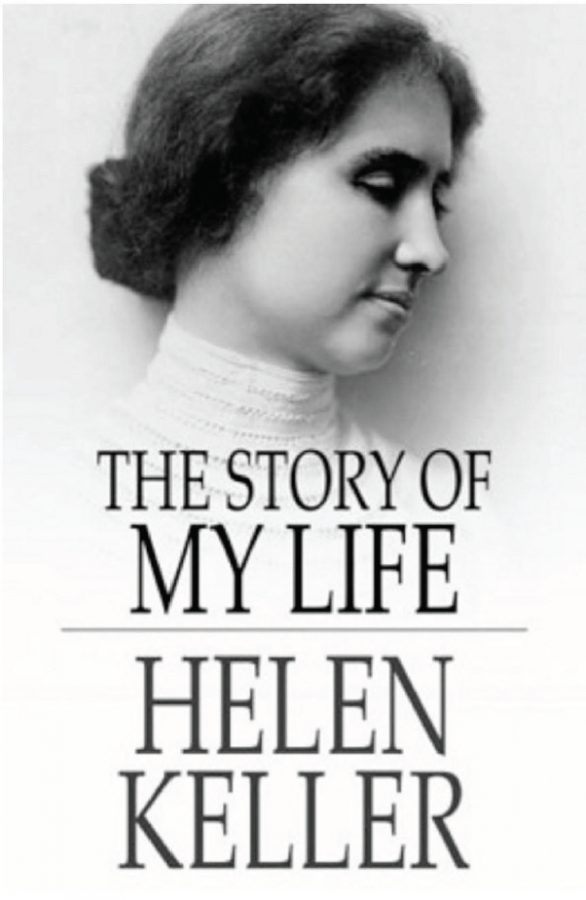The Story of my Life : Helen Keller’s life through her mind and hands
The Story of my Life Written by: Helen Keller Published by: Doubleday, Page & Co. Page Count: 76 Price: $6.60 Reviewed by: Elyse Kratchman
More stories from Elyse Kratchman
“The best and most beautiful things in the world cannot be seen or even touched. They must be felt with the heart.” – Helen Keller
In 1904, Helen Keller was the first blind and deaf person to graduate from Radcliffe College in Cambridge, an accomplishment only a dedicated, creative, and brave person can do.
With the choice of many American Modern Novels, such as T he Sun also Rises by Ernest Hemingway, The Jungle by Upton Sinclair, and A Portrait as a Young Man by James Joyce, The Story of my Life struck my eyes.
How could a person who is blind and deaf, not only learn to read, but also write her own autobiography?
Before reading Keller’s autobiography, I embarked on Anne Frank’s Journey through the novel A Diary of a Young Girl, and Booker T. Washington’s novel, Up from Slavery. The Story of my Life reinforced my love for the genre of autobiographies and biographies.
Keller’s autobiography, The Story of my Life, gave me chills as I flipped through the pages and re-lived her life. While Helen Keller has one of the rarest disabilities, she never let her illness stop her from fulfilling her happiness and getting an education.
Helen Keller was born on June 27th, 1880 in Tuscumbia, Alabama. Her family was southern born and raised and held close relations with confederate leaders, including Robert E. Lee. She was born with all her senses, and she showed signs of “eager and self asserting deposition” as a child.
Before she was two years old, she was diagnosed with a condition that took away her sight and hearing. Her illness created many obstacles; however, it also brought her to many influential people and events. Throughout her lifetime, she has met a number of famous and influential people, such as Alexander Graham Bell and Mark Twain.
The most prestigious person in Helen Keller’s life was her teacher, Anne Sullivan, The autobiography outlines how much of an impact one person can make on another.
“The most important day I remember in all my life is the one on which my teacher, Miss.Sullivan, came to me.”
Thanks to Miss Sullivan, Keller learned to read with the manual alphabet, write, and appreciate nature and life for what it is. Her lessons extended far out from the classroom for Helen, ones that even we can learn from.
“It is not necessary that one should be able to define every word and give it its principal parts and grammatical position in a sentence in order to understand and appreciate a fine poem.”
In addition to the meaningful messages Helen Keller portrayed, her style and vocabulary embodied her personality and intellect. Metaphors flooded her autobiography.
“I slip back many times, I fall, I stand still, I run against the edge of hidden obstacles, I lose my temper and I find it again and keep it better, I tried on, I gain a little, I feel encourage, I get more eager and climb higher and begin to see the widening horizon.”
One of my favorite attributes of the modern work is how I can relate to Helen Keller’s struggles with school, even though the times and the situations are greatly different. While Keller was in college, she commented on how difficult it was to study for exams when she knew she would be graded. As a high school student, I understand the stress and frustration of the endless studying for exams.
“When one reads horribly and nervously, having in mind written test examinations, one’s brain becomes encumbered with a lot of choice bric-a-brac for what there seems to be a little use.”
While The Story of my Life had many favorable qualities, I often found myself reading over pages and pages of meaningless materials. Being an honors student, Keller read many plays, books, and poems. She used her autobiography to review these materials; however, I found these critiques distracting. While these readings were important to Keller and her life, her distinct thoughts on these books were not important to me.
Despite the occasional scrambling, the autobiography was kept to a minuscule seventy-six pages. Whether you are a student looking for a quick autobiography, or an adult searching for an easy read, The Story of my Life is a perfect candidate.
All ages can find inspiration within the book. It is an amazement how a person as troubled as Helen Keller can achieve so much while keeping a positive outlook.
“Everything has its wonders, even darkness and silence, and I learn, whatever state I may be in, therein to be content.”
After finishing the story, I was left with a major take-away: never take anything for granted. I am thankful for my education, as Helen Keller prioritized hers. I am thankful for my senses, as Helen Keller was missing two of hers. I am thankful for my teachers and leaders, as Helen Keller idolized hers.
In 1968, Helen Keller died at the age of eighty-seven. With every day of school, every honor, and every leap of faith Helen, she paved the way for future people like her and empowered every person she encountered. While Helen Keller achieved many things, the most outstanding one, is how she valued and appreciated “The Story of her Life.”
Empower your senses with Helen Keller’s: The Story of my Life.


